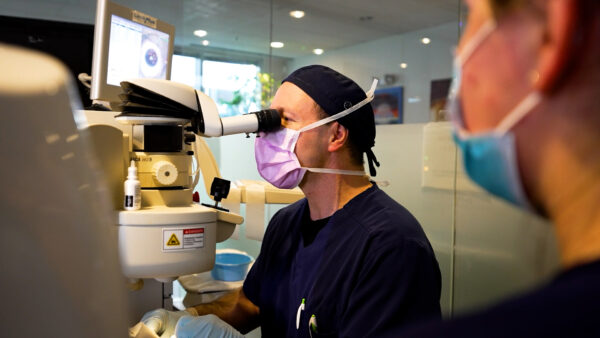LASIK eye surgery is a highly sought-after and safe procedure designed to reduce or eliminate the need for glasses or contact lenses, providing improved vision through advanced laser technology. While it is a quick and straightforward procedure, there are many details to consider before making this life-changing decision.
In a nutshell, what is everything you need to know about this surgery?
What is LASIK eye surgery?

LASIK eye surgery, Laser-assisted in situ keratomileusis, is a minimally invasive outpatient surgical option used to treat common vision problems such as nearsightedness, farsightedness, astigmatism, and presbyopia. Approved since the mid-1990s, it became the world’s most common elective procedure by 2001.
Modern LASIK or “Bladeless LASIK”, names like iLASIK™, IntraLASIK™, or all-laser LASIK utilizes femtosecond lasers to create the corneal flap instead of traditional blades. By reshaping the cornea, LASIK improves how light is focused on the retina, resulting in clearer vision.
At The LASIK Vision Institute, expert LASIK surgeons exclusively perform 100% bladeless LASIK, which broadens eligibility for patients and promotes faster recovery.
Who is a Candidate for LASIK eye surgery?

About 80 percent of the adults are candidate for LASIK eye surgery. Common characteristics of candidates include:
- Age: 18 or older (with stable vision prescriptions)
- Vision Issues: Astigmatism, nearsightedness, or farsightedness
- Active Lifestyle: Preference to avoid glasses or contact lenses
- Good Overall Health
The best way to determine your candidacy is to consult a provider specializing in LASIK eye surgery.
What to Expect: Before, During, and After LASIK Surgery
Below is a quick overview of what you can expect during your LASIK journey:
Preoperative
- Complimentary evaluation to assess candidacy (60–90 minutes)
- Consultation with a medical team to discuss personalized solutions
- Preparation for surgery (if eligible and ready to proceed)
- Discussion of costs and payment options
During Surgery
- Final paperwork and payment
- Procedure duration: 10–15 minutes
- Post-treatment exam and review of medications and restrictions
Postoperative
- Rest (e.g., take a nap immediately after surgery)
- Attend follow-up exams as instructed
- Follow all postoperative guidelines for medications and activities
- Contact your doctor if concerns arise
How safe is LASIK eye surgery?

LASIK is one of the safest and most effective elective procedures available. Studies show:
- 99% of patients achieve better vision than 20/40.
- Over 90% achieve 20/20 vision or better.
- LASIK boasts a 96% patient satisfaction rate, the highest of any elective surgery (Journal of Cataract & Refractive Surgery).
Additional Safety Facts:
- LASIK has never been the exclusive cause of blindness. Contact lenses, on the other hand, cause blindness-inducing infections in 1 in 500 users annually.
- Contact lenses may lead to 8 times more eye infections than LASIK (Cureus Medical Journal).
- An FDA study found that fewer than 1% of LASIK patients experienced worsened vision post-surgery.
At The LASIK Vision Institute, we ensure the highest safety standards, with advanced technology and rigorous protocols, including eye-tracking systems that halt the procedure if necessary.
How much does LASIK eye surgery cost?

The cost of laser eye surgery reflects an elective procedure that has been called life changing. Many people reduce their need for glasses and contacts for years. The money saved on associated costs reflects only part of the surgery’s value though.
The cost of LASIK Eye Surgery in the United States ranges from $1,500 – $5,000** per eye according to Market Scope’s most recent US Ophthalmologist Survey.
At The LASIK Vision Institute, we provide:
- Transparent pricing tailored to your vision needs.
- A lifetime assurance plan with no hidden fees.
- Payment plans and financing options, including CareCredit, FSA/HSA accounts, and guaranteed in-house financing.
- Price Match guarantee
How Can LASIK Help Me?
LASIK is a solution for those that are seeking better vision and simply wanting convenience for life’s activities and not being dependent on glasses or contacts. Laser eye surgery treats the following conditions:
- Nearsightedness (myopia). You can see objects better if they’re up close, but those far away are fuzzy or blurred.
- Farsightedness (hyperopia). You can see objects better from far away but struggle with those up close.
- Astigmatism. This is blurred vision when viewing objects at any distance. It’s due to an irregularly shaped cornea and occurs along with myopia or hyperopia.
- Presbyopia (age-related hyperopia). As you get older, the lens of your eye grows less flexible. As a result, it’s harder for you to see things close to your face. LASIK, which targets your cornea, can’t correct presbyopia. But with a technique called monovision (blended vision), LASIK can correct one eye for distance and the other eye for near vision. This improves your close-up vision and helps with tasks like reading.
LASIK Technology

At The LASIK Vision Institute®, we provide you with the latest FDA-approved LASIK and diagnostic technology to ensure safe and effective vision correction.
Wavelight LASIK Laser:
This advanced wavefront-optimized technology reshapes the cornea to correct refractive errors, ensuring efficient and personalized LASIK treatments.
- Alcon’s Contoura Vision: By combining corneal topography and wavefront-guided technology, Contoura Vision creates highly customized LASIK treatments. It addresses common refractive errors and higher-order aberrations for improved visual outcomes.
- Wavelight EX500: Known for its speed and accuracy, this laser system incorporates advanced eye-tracking to provide precise, wavefront-optimized treatments.
- VISX Excimer Lasers: These reliable lasers utilize wavefront-guided technology to tailor treatments based on individual eye characteristics.
- Nidek EC-5000: Offering precision and versatility, this excimer laser system is effective for treating various refractive errors.
Femtosecond Lasers:
- IntraLase iFS (Johnson & Johnson Vision): This laser creates corneal flaps with exceptional precision, enhancing safety and customization.
- Alcon FS200: Utilizing low pulse energy, this femtosecond laser system ensures precise and consistent corneal flap creation.
- Zeiss VisuMax: Renowned for its precision, this laser enables bladeless, highly accurate corneal flap creation with ultrafast pulses of light.
What Should I Do If I’m Interested in LASIK?
If you’re considering LASIK, consult a specialized provider like The LASIK Vision Institute, which focuses exclusively on laser vision correction.
In addition, knowing what questions to ask during an exam is just as important. You can access a “checklist” that the American Academy of Ophthalmology put together here to help you.
Here, at The LASIK Vision Institute, we offer a few different options to get started, including:
- Virtual Consultation: A 15-minute introduction to the process.
- Comprehensive In – Person Evaluation: 60-90 minutes to determine candidacy
- Same Day Treatment: evaluation and surgery on the same day
Take the first step and schedule your FREE LASIK consultation today. Let us help you achieve the vision you deserve!

Find a LASIK Surgery Location Near You
We’re located nationwide – it’s easy to find a LASIK Vision Center near you.
References:
American Academy of Ophthalmology (2024) Questions to Ask When Considering LASIK. Retrieved from https://www.aao.org/eye-health/treatments/lasik-questions-to-ask
American Refractive Surgery Council (2017). What is the success rate of LASIK? Retrieved from: https://americanrefractivesurgerycouncil.org/laser-eye-surgery-lasik-success-rate/#
Cleveland Clinic (n.d.). LASIK Eye Surgery. Retrieved from: https://my.clevelandclinic.org/health/treatments/21805-lasik-eye-surgery
Cureus (2022). A Review of Contact Lens-Related Risk Factors and Complications. Retrieved from: https://www.cureus.com/articles/110821-a-review-of-contact-lens-related-risk-factors-and-complications#!/
Food & Drug Administration(2021). LASIK Quality of Life Collaboration Project. Retrieved from https://www.fda.gov/medical-devices/lasik/lasik-quality-life-collaboration-project
LASIK.com (2025). What is the Cost of LASIK in 2025? Retrieved from https://www.lasik.com/how-much-does-lasik-cost/
LASIK.com (2024). What is Modern LASIK? Retrieved from https://www.lasik.com/what-is-modern-lasik/
Mayo Clinic (n.d.). LASIK Eye Surgery. Retrieved from https://www.mayoclinic.org/tests-procedures/lasik-eye-surgery/about/pac-20384774
Disclaimer: This information is for general knowledge and informational purposes only and does not constitute medical advice. Consult with a qualified healthcare professional fordiagnosis and treatment of any medical conditions.
Categories:



